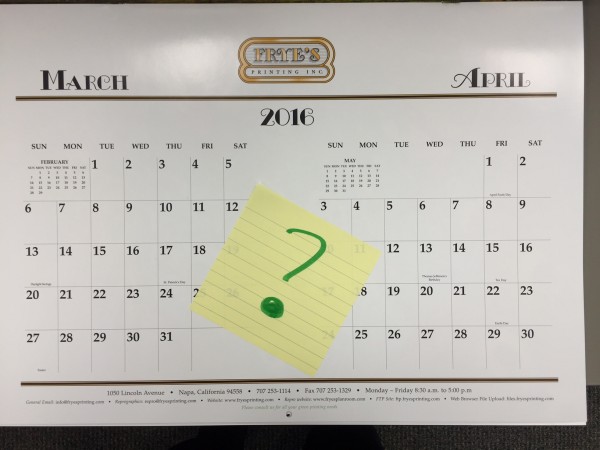Calendar Confusion
Note: this post originally appeared on LinkedIn.
Do you suffer from tax season deadline confusion? Let me help you gain some perspective.
While it gets confusing at times figuring out which United States income tax return is due when, it is far easier than figuring out the date of many springtime religious holidays, festivals, or celebrations. Here are just a few events to consider:
- For those who celebrate Easter, a complex bit of calculus is necessary. I was raised Catholic and remember every year when my Dad would recite the complicated rules for figuring out the day of Easter celebrations every year. According to TimeandDate.com these rules are: “ In 325CE the Council of Nicaea established that Easter would be held on the first Sunday after the first full moon occurring on or after the vernal equinox.(*) From that point forward, the Easter date depended on the ecclesiastical approximation of March 21 for the vernal equinox.”
You can read more about this calculation at the Astronomical Applications Department of the U.S. Naval Observatory here.
- For those who celebrate Passover, which falls in March or April according to the Hebrew calendar, planning ahead for the date can be just as taxing. *
- The Hindu religion has a similar connection to the full moon and holds its Holi festival on the day after the full moon in the Hindu Month of Phalguna. *
So how, you might ask, have the tax return filing deadlines been determined?
There is no lunar connection, but, as it turns out, our tax filing deadlines are closely related to what happens with highways and veterans affairs.
These deadlines were recently modified under the provisions of a bill known as the “Surface Transportation and Veterans Health Care Choice Improvement Act of 2015”. As part of the revenue-generating provisions to fund certain highway related investments, Congress changed the filing deadlines for certain federal income tax returns.
As a result, certain federal returns will have new filing Deadlines effective for taxable years starting after December 31, 2015.
Your 2016 income tax return, generally due in 2017, may have a different filing deadline than the one you file this year.
Here are the tax return filing deadlines for years beginning in 2016 as modified (items changed are shown in red.)

The American Institute of Certified Public Accountants (AICPA) has created a comprehensive guide to Federal Tax Return deadlines that is available here.
And by the way, your 2015 United States federal business income tax returns (except partnerships) are due today (March 15, 2016). State deadlines may vary. But we can always file an extension.
* Source : https://diversity.umn.edu/eoaa/religiousobservancedates
@ C Corporation Fiscal Year End (other than Dec. 31 or June 30) is currently due on the 15th day of 3rd month after year-end and can be extended to the 15th day of 9th month after year-end. Under the new law, it will be due on the 15th day of 4th month after year-end and can be extended until the 15th day of 10th month after year-end.
# This change resulted from a provision of the PATH Act “Protecting Americans from Tax Hikes Act of 2015.”

Also, confusing is Chinese New Year and Mardi Gras. Who knows when they occur. At least, the Irish know how to party right. St. Patrick’s Day is always March 17.